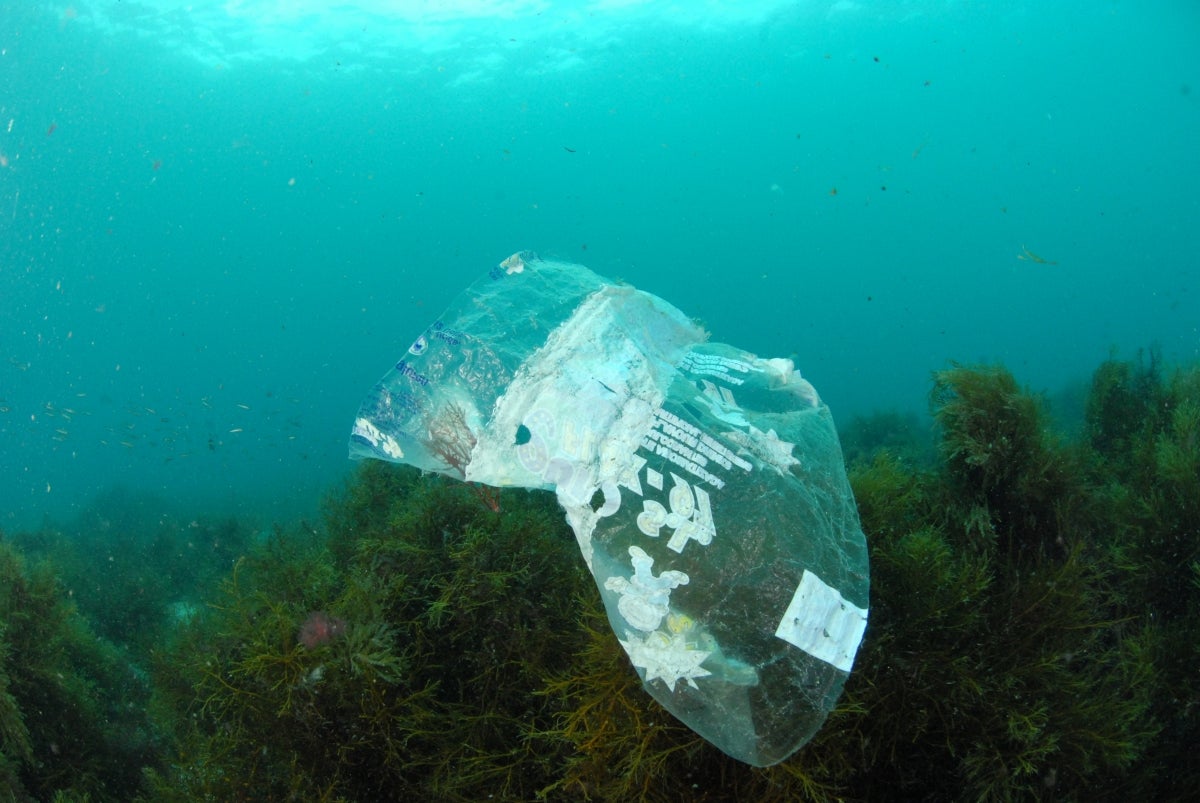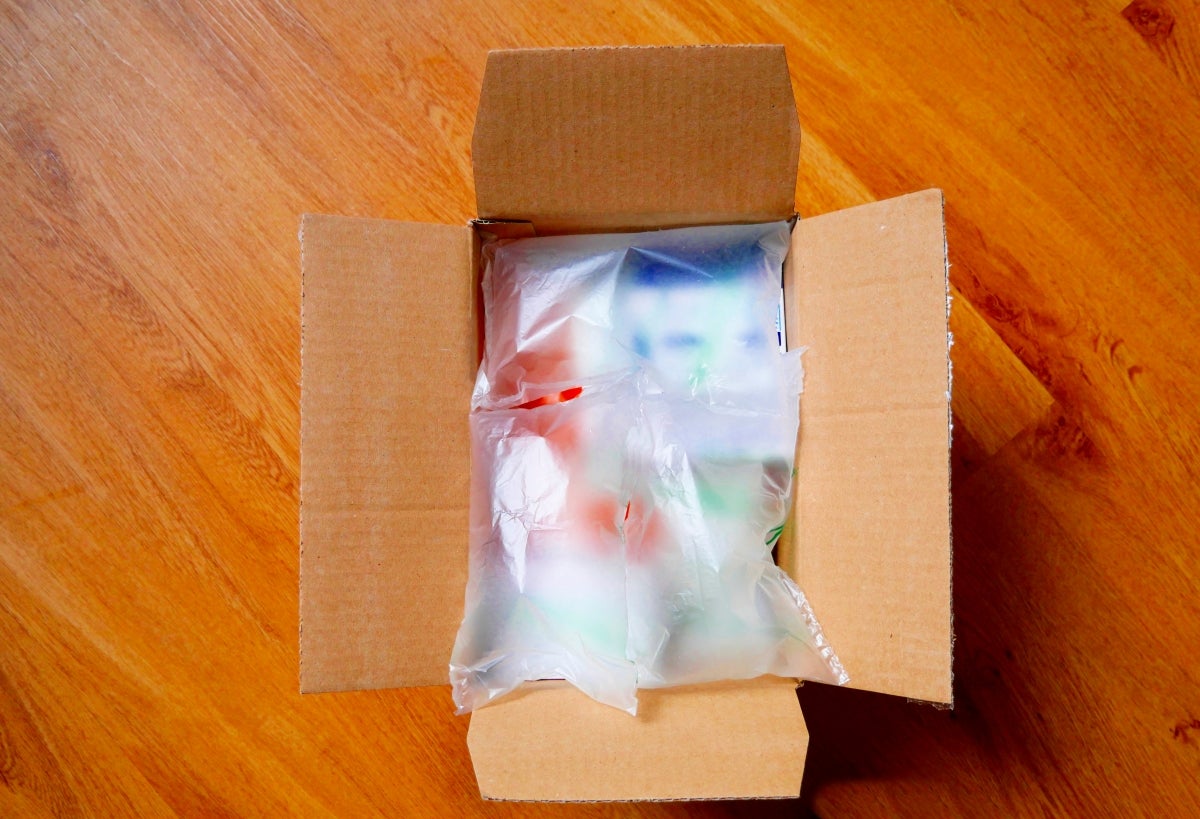December 22, 2020
Opting Out: Amazon shoppers would choose plastic-free packaging if they had a choice
BY: Emily Nuñez
If convenience is what you value most in a shopping experience, you’d be hard-pressed to find a better outlet than Amazon. With millions of products, fresh groceries, and same-day delivery right to your doorstep, it’s no wonder that Amazon has become the world’s largest online retailer, delivering 7 billion packages last year alone. That is roughly one package for every person on the planet – but unfortunately, many of these deliveries come with a side of plastic.
According to a new Oceana report based on available industry data and the company’s market share by country, Amazon generated an estimated 465 million pounds (211 million kilograms) of plastic packaging in 2019. Imagine, for a moment, that all of that trash took the form of inflatable “air pillows,” which are increasingly replacing bubble wrap. It would create a plastic trail long enough to circle the Earth 500 times. The company disputes these and other figures but has not yet provided Oceana with alternative data or specific estimates – by country – detailing the plastic footprint generated by Amazon and its marketplace vendors.
In the meantime, Amazon customers are left pondering, ‘What will happen to all of this plastic packaging left behind?’ Essentially none of those plastic bags, bubble-lined mailers, or air pillows are recycled – at least not in any practical sense. Most curbside recycling programs don’t accept this kind of plastic and, worse yet, if it’s mistakenly placed in a recycling bin it could contaminate other types of plastic waste that otherwise would have been recycled.
This leaves two options for Amazon customers who are concerned about plastic pollution. One is to chuck their plastic waste in the trash bin, then try to shake off the guilt. The other (if they live in the U.S. or Canada) is to visit plasticfilmrecycling.org, enter their zip code, and take a trip to the nearest drop-off center that’s willing to accept their “flexible plastics,” which must be processed separately because they get caught in recycling machines.
For customers in rural areas, this is asking a lot. To give one example, residents of Calistoga, California, must drive nearly 22 miles to a Target store to offload their otherwise unrecyclable plastics. Overall, less than 2% of Amazon Prime customers in the U.S. made a special trip to bring their plastic packaging to a grocery store to be recycled, according to a recent Oceana poll.
But there’s a third possible option, and it’s one that wouldn’t force customers to make difficult decisions or spend their Saturday mornings schlepping bags of plastic packaging to the supermarket. Once customers reach the checkout page, Amazon could let them tick a box to opt for plastic-free packaging. This is the option Oceana is advocating for through its campaign, launched last summer to address the increasingly pressing need for Amazon to provide plastic-free alternatives.
Amazon said in its second quarter earnings report that its sales had increased by 40% (compared to the same quarter the previous year). This is partly because, in the midst of a global pandemic, many people have been shopping online instead of at brick-and-mortar stores.
Considering that “the new normal” will soon be carried over to a new year, it seems likely that the deluge of Amazon packages – and plastic packaging – will only get worse.
Amazon’s ‘plastic footprint’
Unfortunately, given the increasing amount of plastic finding its way into marine enviroments, that could spell disaster for ocean animals and habitats. Using a combination of industry data and country-specific scientific data pertaining to plastic leakage into seas, lakes, and rivers, Oceana estimated that up to 22.4 million pounds (10.2 million kilograms) of Amazon’s plastic packaging polluted freshwater and marine ecosystems last year. That’s the equivalent of up to a delivery van’s worth of plastic polluting the ocean every 70 minutes.
“Oceana’s report finds that there is a real risk that Amazon’s plastic packaging, which is practically not recycled, will end up in the oceans,” said Oceana Director of Strategic Initiatives Anne Schroeer. “Plastic bags, and the kind of plastic used by Amazon, can be mistaken for food and ingested, harming sea turtles and other ocean animals. We need Amazon to do what they do best: imagine the unimaginable, invent and innovate, reduce their plastic footprint, and switch to reusable packaging to end this cycle of waste.”
Plastics are not only a danger to marine ecosystems but also a major contributor to climate change. If plastics were a country, they would be the planet’s fifth-largest emitter of greenhouse gases. Amazon’s efforts to reduce its fuel usage, waste, and emissions are laudable, but the company’s large plastic footprint is highly problematic. The climate crisis and plastics crisis are intrinsically linked, and it is counterproductive to try and tackle one problem without addressing the other.
Oceana believes Amazon can expand programs that reduce plastic and limit the amount of extraneous packaging they use, in addition to giving customers a plastic-free packaging option at checkout.
Giving customers a say in their preferred packaging materials would not be a huge stretch for a company of Amazon’s size and influence. Amazon customers are already able to customize some of their shipping preferences and ask that items be sent in fewer boxes. Recently, the company even unveiled a “Climate Pledge Friendly” label for products that meet certain environmental standards. A plastic-free packaging option would go one step further and let shoppers avoid the types of plastic that all too often end up in the ocean.
In fact, this is an option that customers want. When Oceana polled Amazon shoppers in the U.S., UK, and Canada, it found that 86% are concerned about plastic pollution and 87% think major online retailers like Amazon should curb the amount of plastic packaging they use.
‘We’re at a crossroads’
Like many Amazon shoppers, marketing strategist and conservationist Nicole Delma isn’t thrilled when she gets a package brimming with plastic. Delma became acutely aware of the plastic pollution crisis 20 years ago, when she appeared on a reality TV show that many are familiar with.
“I was filming a show called Survivor in Panama, in what was supposedly a completely untouched part of the Earth, and there was a tremendous amount of man-made plastic inland and in the water, even back then,” Delma said. “That’s when I realized that it was such a prevalent and lasting issue.”

Indeed, plastic has been found in the deepest parts of the ocean, including the Mariana Trench at 36,000 feet down. While Amazon is not the only company that uses plastic packaging, it’s one of the largest – and Delma thought it was a pretty good place to direct her efforts.
So she created an online petition – available at Change.org/PlasticFreeChoice – calling on Amazon to offer plastic-free packaging options. It has garnered more than 674,000 signatures, and the list of names continues to grow each day.
“I’m an Amazon customer – most everyone I know is an Amazon customer – and I think that there’s not really any plan for people to change the way that they’re consuming,” Delma said. “But we’re at a crossroads now where we’re realizing, ‘What is the cost of that convenience?’”
Amazon India’s example
One need not have an overactive imagination to envision a scenario where Amazon reduces its plastic footprint. All you need to do is look east. As of June 2020, Amazon has eliminated non-recyclable plastic from its fulfillment centers across India.
This decision followed Indian Prime Minister Narendra Modi’s vow to ban single-use plastics, which are not easily processed in India due to a lack of facilities. Roughly 77% of the country’s plastic ends up in massive trash heaps, with one of New Delhi’s landfills standing about as tall as the Taj Mahal.
“I urge the start-up founders, technicians, and industrialists to find ways to recycle plastic,” Modi said in a speech last year. “Single-use plastic is the root cause of many of our problems – but the solution has to come from within, from us.”

Given that India is the second most populous country in the world, Amazon’s decision to eliminate non-recyclable plastic nationwide was no small feat. However, former Amazon executive Rachel Johnson Greer believes that Amazon could easily replicate this success in the West. She explained that Amazon can instruct the companies it works with – either their own suppliers or those that sell on the Amazon Marketplace – to package items in a certain way.
“If Amazon were to tell its sellers tomorrow, ‘You have to do 1, 2, 3,’ they would comply, and I think most sellers would be perfectly fine not having plastic packaging,” she said. “Amazon has the technical ability with its fulfillment centers to offer plastic-free alternatives to its customers, reduce plastic, and help protect the oceans and the environment. It is really a question of will.”
A prime time to speak out
Just as sellers listen to Amazon, Amazon listens to its customers. As Greer put it, “Customers are everything to Amazon. They’re as close to a monopoly as possible because they care about customers.”
CEO Jeff Bezos and other Amazon leaders have previously said that Amazon is “obsessed” with meeting the needs and wants of its customers, and the time has come to put that promise to the test. In addition to signing Delma’s petition, you can take action by making your voice heard on social media. Tell Amazon that you want a plastic-free packaging choice by tagging or mentioning them in your posts with the “@amazon” handle on Instagram, Facebook, and Twitter. (To see sample messages, click here and scroll down to the “take action” section.)
With single-use plastics taking an ever-increasing toll on the planet, we cannot afford to wait for another 7 billion (or more) Amazon packages to be shipped next year. Amazon owes its success to its customers, and those customers deserve a plastic-free packaging choice at checkout. For a global giant like Amazon, this is a small ask – but it’s a change that would make a world of difference to the oceans.
A version of this story appears in the current issue of Oceana Magazine. Read it online here.



